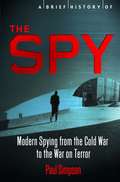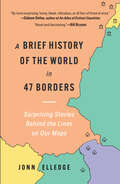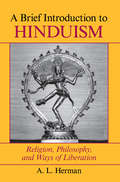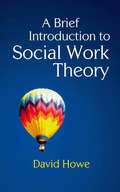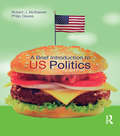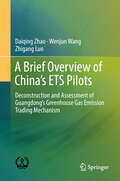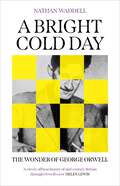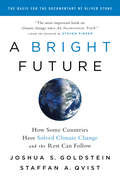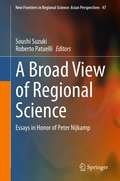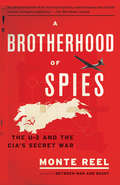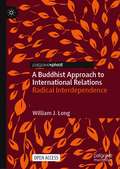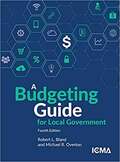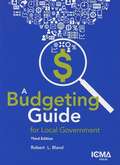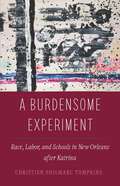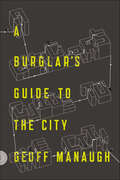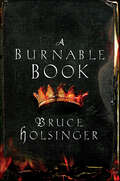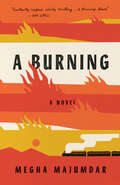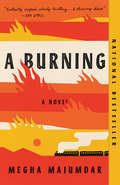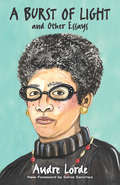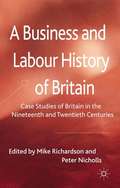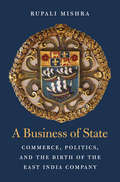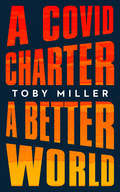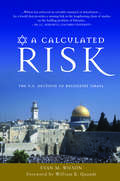- Table View
- List View
A Brief History of the Spy: Modern Spying from the Cold War to the War on Terror (Brief Histories)
by Paul SimpsonFrom the end of the Second World War to the present day, the world has changed immeasurably. The art of spying has changed too, as spies have reacted to changing threats. Here you will find the fascinating stories of real-life spies, both famous and obscure, from either side of the Iron Curtain, along with previously secret details of War on Terror operations.Detailed stories of individual spies are set in the context of the development of the major espionage agencies, interspersed with anecdotes of gadgets, trickery, honeytraps and assassinations worthy of any fictional spy.A closing section examines the developing New Cold War, as Russia and the West confront each other once again.
A Brief History of the World in 47 Borders: Surprising Stories Behind the Lines on Our Maps
by Jonn Elledge#1 International Bestseller Every border tells a surprising story in this uncommonly enlightening history that will change the way you understand the world “A novel and fascinating perspective on world history.”—Bill Bryson, author of A Short History of Nearly Everything Many lines on the map are worth far more than a thousand words, going well beyond merely marking divisions between nations. In this eye-opening investigation into the most remarkable points on the map, a single boundary might, upon closer inspection, reveal eons of history—from epic tales of conquest, treaties, and alliances to intimate, all-too-human stories of love, greed, and folly. Sometimes rooted in physical geography, sometimes entirely arbitrary, none of the lines we know today were inevitable, and all might have looked quite different if not for the intricate interplay of chance and ambition. By listening to the stories these borders have to tell, we can learn how political identities are shaped, why the world’s boundaries look the way they do—and what they tell us about our world and ourselves. From the very first maps in Egypt to the Roman attempts to define the boundaries of civilization, from the profound shift in meaning of the Mason–Dixon line to the secret British-French agreement to carve up the Ottoman Empire during the First World War, and from the dark consequences of Detroit’s city limits to the intriguing reason why landlocked Bolivia still maintains a navy, this is a singular look at human history—told through its most spellbinding border stories.
A Brief Introduction To Hinduism: Religion, Philosophy, And Ways Of Liberation
by A. L. Herman“I have read Arthur Herman’s Introduction to Hinduism with considerable interest and pleasure. It is bold and innovative, clearly written, well organized, and quite provocative.” —Eliot Deutsch University of Ha wail at Manoa
A Brief Introduction to Social Work Theory
by David HoweThis crisp text, by one of social works most highly regarded commentators, offers the perfect entry point into the complex world of social work theory. Written in a clear conversational style and organized into short, clearly labelled chapters, students and practitioners will find this an invaluable point of refreshment and reference.
A Brief Introduction to US Politics
by Robert J. MckeeverA Brief Introduction to American Politicsprovides a coherent and succinct account of how contemporary American politics blends enduring principles with the realities and demands of the present day. Beginning with a brief overview of American society today, the book introduces the constitutional framework of American politics and the fluid concept and practice of federalism. It also covers the major features of the representative process, looking at both elections and main players such as parties, interest groups, and the media. Chapters on the major institutions of the federal government - the presidency, the Congress, and the Supreme Court – examines how they are simultaneously independent and constrained by each other. Chapters on domestic and foreign policy demonstrate how government and politics work in connection with the system’s main outputs. A Brief Introduction to American Politicsis a shorter version of Politics USA and is intended for students who need an introduction to the essential features of the American political system.
A Brief Overview of China’s ETS Pilots: Deconstruction And Assessment Of Guangdong's Greenhouse Gas Emission Trading Mechanism
by Daiqing Zhao Wenjun Wang Zhigang LuoThis book systematically introduces readers to the framework of China’s ETS pilots, exploring their design and operating process, the current state of the carbon market, and various barriers encountered. To do so, it deconstructs the Guangdong ETS, which is the largest and most representative of China’s seven ETS pilots. The book subsequently describes and evaluates all seven pilots in terms of their efficiency, macro and micro effects, the method involved in the DEA model, the CGE model, and cost-benefit analysis. In turn, in the assessment section it demonstrates how some ETS pilots have failed to control carbon emissions due to inordinately high emissions quotas issued by the local government etc. Further, it argues that ETS should focus on those industries with large emissions and high mitigating potential for the time being, and then gradually expand the scale of its coverage.As China’s national ETS is slated for launch on the basis of the lessons learned from the ETS pilots, the book offers a timely and valuable resource for all those who want to understand and forecast the development of China’s ETS. It includes a wealth of descriptions and explanations of Chinese government policies involving carbon emissions control, making it a unique resource.
A Bright Cold Day: The Wonder of George Orwell
by Nathan WaddellA pioneering biography of George Orwell told through moments of everyday life 'A clever, offbeat history of mid-century Britain through George Orwell&’s eyes.' Helen Lewis When we think about Orwell, we imagine an angular, moustachioed sceptic crouched over a typewriter, who – between puffs on his cigarette – composes effortless streams of prose, unadorned but explosive. We see a man with &‘Important Things to Say&’ about: the slow creep of authoritarianism; the consequences of all-seeing tech; the fragility of truth. Much less often do we see him as a person caught up in the business of everyday life. And yet Orwell&’s work thrums with the quotidian: the smell of boiled cabbage, the chill of an unheated flat in early spring, the rumbling of old pipes. A Bright Cold Day reveals how the principles that govern us begin in the mundane. From waking and showering to breakfast, work, lunch, the pub, sleep and dreaming, Orwell was never dulled to the routines of living. And in the details of the day, we can understand how power, money, freedom and choice play out, not just for Orwell&’s literary characters, but for us all. *** 'An astute and intimate portrait of George Orwell.' Dorian Lynskey, author of The Ministry of Truth 'Beautifully written... urgent and compelling.' Emma Smith, author of Portable Magic
A Bright Future: How Some Countries Have Solved Climate Change and the Rest Can Follow
by Steven Pinker Joshua S. Goldstein Staffan A. QvistThe first book to offer a proven, fast, inexpensive, practical way to cut greenhouse gas emissions and prevent catastrophic climate change. As climate change quickly approaches a series of turning points that guarantee disastrous outcomes, a solution is hiding in plain sight. Several countries have already replaced fossil fuels with low-carbon energy sources, and done so rapidly, in one to two decades. By following their methods, we could decarbonize the global economy by midcentury, replacing fossil fuels even while world energy use continues to rise. But so far we have lacked the courage to really try. In this clear-sighted and compelling book, Joshua Goldstein and Staffan Qvist explain how clean energy quickly replaced fossil fuels in such places as Sweden, France, South Korea, and Ontario. Their people enjoyed prosperity and growing energy use in harmony with the natural environment. They didn't do this through personal sacrifice, nor through 100 percent renewables, but by using them in combination with an energy source the Swedes call kärnkraft, hundreds of times safer and cleaner than coal. Clearly written and beautifully illustrated, yet footnoted with extensive technical references, Goldstein and Qvist's book will provide a new touchstone in discussions of climate change. It could spark a shift in world energy policy that, in the words of Steven Pinker's foreword, literally saves the world.
A Broad View of Regional Science: Essays in Honor of Peter Nijkamp (New Frontiers in Regional Science: Asian Perspectives #47)
by Roberto Patuelli Soushi SuzukiThis book celebrates the life and work of Peter Nijkamp, whose research provides a strong focus on regional science. His work follows a rigorous, comprehensive approach, centred around analytical modelling and methodological innovation. This edited volume, like Prof Nijkamp’s research, covers a wide range of topics in regional science, analysed through multi-criteria evaluation, evaluation modelling, econometrics, and simulations, among other methods. These tools are applied to the analysis of society and culture, tourism and information, cities, environment and sustainability. Professor Nijkamp is one of the founders and the past president of the Regional Science Association International. His work forms a valuable reference for researchers, scholars, policymakers, and students in the field of regional science and other disciplines. This volume, timed to coincide with his 75th birthday, celebrates Prof Nijkamp’s great contributions to regional science. He also promoted and participated in the education and development of young researchers not only in regional science but also in other fields, supervising many Ph.D. students and hosting even more as guests in Amsterdam. Contributors to this volume include Prof Nijkamp’s former doctoral students and guest researchers, as well as associates and colleagues.
A Brotherhood of Spies: The U-2 and the CIA's Secret War
by Monte ReelA thrilling dramatic narrative of the top-secret Cold War-era spy plane operation that transformed the CIA and brought the U.S. and the Soviet Union to the brink of disasterOn May 1, 1960, an American U-2 spy plane was shot down over the Soviet Union just weeks before a peace summit between the two nations. The CIA concocted a cover story for President Eisenhower to deliver, assuring him that no one could have survived a fall from that altitude. And even if pilot Francis Gary Powers had survived, he had been supplied with a poison pin with which to commit suicide. But against all odds, Powers emerged from the wreckage and was seized by the KGB. He confessed to espionage charges, revealing to the world that Eisenhower had just lied to the American people--and to the Soviet Premier. Infuriated, Nikita Khrushchev slammed the door on a rare opening in Cold War relations. In A Brotherhood of Spies, award-winning journalist Monte Reel reveals how the U-2 spy program, principally devised by four men working in secret, upended the Cold War and carved a new mission for the CIA. This secret fraternity, made up of Edwin Land, best known as the inventor of instant photography and the head of Polaroid Corporation; Kelly Johnson, a hard-charging taskmaster from Lockheed; Richard Bissell, the secretive and ambitious spymaster; and ace Air Force flyer Powers, set out to replace yesterday's fallible human spies with tomorrow's undetectable eye in the sky. Their clandestine successes and all-too-public failures make this brilliantly reported account a true-life thriller with the highest stakes and tragic repercussions.
A Buddhist Approach to International Relations: Radical Interdependence
by William J. LongThis book is an open access book. Many scholars have wondered if a non-Western theory of international politics founded on different premises, be it from Asia or from the “Global South,” could release international relations from the grip of a Western, “Westphalian” model. This book argues that a Buddhist approach to international relations could provide a genuine alternative. Because of its distinctive philosophical positions and its unique understanding of reality, human nature and political behavior, a Buddhist theory of IR offers a way out of this dilemma, a means for transcending the Westphalian predicament. The author explains this Buddhist IR model, beginning with its philosophical foundations up through its ideas about politics, economics and statecraft.
A Budgeting Guide For Local Government
by Robert L Bland Michael R. OvertonDiscover new arenas that shape the “warp and woof” of budgets and the policies and processes managers use to craft spending decisions. Navigating the increasingly complex crosscurrents of local government finance has become an essential skill for today’s public administrator. The convergence of rising expectations from citizens and council members, anemic growth in revenue sources, and unfunded pensions now coming due has complicated the local manager’s task of preparing a budget that balances revenues with expenditures. More fundamentally, today’s managers must deliver services at a time when public confidence in government and its ability to perform have reached unparalleled lows. This book examines the issues that a local manager confronts in developing a budget— both the choice of public services and projects to provide, and the choice of revenue sources used to pay for them. When formulating a budget, the manager must balance what is economically best, politically expedient, and administratively possible. Because the manager must also respond to citizens’ perceptions of an issue, whatever their accuracy, this book also examines budgets in those terms. In a more general sense, effective leadership requires that the public administrator shape as well as follow public opinion. The recommendations made throughout this book are designed to enhance citizens’ confidence in the responsiveness and competence of local government leaders.
A Budgeting Guide for Local Government
by Robert L. Bland Michael R. OvertonDiscover new arenas that shape the “warp and woof” of budgets and the policies and processes managers use to craft spending decisions. Navigating the increasingly complex crosscurrents of local government finance has become an essential skill for today’s public administrator. The convergence of rising expectations from citizens and council members, anemic growth in revenue sources, and unfunded pensions now coming due has complicated the local manager’s task of preparing a budget that balances revenues with expenditures. More fundamentally, today’s managers must deliver services at a time when public confidence in government and its ability to perform have reached unparalleled lows. This book examines the issues that a local manager confronts in developing a budget— both the choice of public services and projects to provide, and the choice of revenue sources used to pay for them. When formulating a budget, the manager must balance what is economically best, politically expedient, and administratively possible. Because the manager must also respond to citizens’ perceptions of an issue, whatever their accuracy, this book also examines budgets in those terms. In a more general sense, effective leadership requires that the public administrator shape as well as follow public opinion. The recommendations made throughout this book are designed to enhance citizens’ confidence in the responsiveness and competence of local government leaders.
A Budgeting Guide for Local Government
by Robert L. BlandThis third edition provides a contemporary and strategic perspective on budgeting as it has evolved from an accounting function to a tool for introducing new management strategies and practices to local government.
A Burdensome Experiment: Race, Labor, and Schools in New Orleans after Katrina (Atelier: Ethnographic Inquiry in the Twenty-First Century #18)
by Christien Philmarc TompkinsA free ebook version of this title is available through Luminos, University of California Press's Open Access publishing program. Visit www.luminosoa.org to learn more. In the aftermath of Hurricane Katrina, the New Orleans public school board fired nearly 7,500 teachers and employees. In the decade that followed, the city created the first urban public school system in the United States to be entirely contracted out to private management. Veteran educators, collectively referred to as the "backbone" of the city's Black middle class, were replaced by younger, less experienced, white teachers who lacked historical ties to the city. In A Burdensome Experiment, Christien Philmarc Tompkins argues that the privatization of New Orleans schools has made educators into a new kind of racialized worker. As school districts across the nation backslide on school integration, Tompkins asks, who exactly deserves to teach our children? The struggle over this question exposes the inherent antiblackness of charter school systems and the unequal burdens of school choice.
A Burglar's Guide to the City
by Geoff ManaughA “deeply researched and brilliantly written” blueprint to the criminal possibilities in the world all around us (Warren Ellis, author of Gun Machine).At the core of A Burglar’s Guide to the City is an unexpected and thrilling insight: how any building transforms when seen through the eyes of someone hoping to break into it. Studying architecture the way a burglar would, Geoff Manaugh takes readers through walls, down elevator shafts, into panic rooms, and out across the rooftops of an unsuspecting city.Encompassing nearly two thousand years of heists and break-ins, the book draws on the expertise of reformed bank robbers, FBI special agents, private security consultants, the LAPD Air Support Division, and architects past and present.Whether discussing how to pick padlocks, climb the walls of high-rise apartments, find gaps in a museum’s surveillance routine, or discuss home invasions in ancient Rome, A Burglar’s Guide to the City ensures readers will never enter a bank again without imagining how to loot the vault, or walk down the street without planning the perfect getaway.Praise for A Burglar’s Guide to the City“This burglar’s guide isn’t for ordinary smash-and-grab burglars, it’s for the rest of us—who steal in, steal out, and get away with glorious dreams. A spectacularly fun read.” —Robert Krulwich, cohost of Radiolab“Who knew that urban studies could be so riveting? Geoff Manaugh excels at finding new, illicit, and fresh angles on a subject as loved as it is overexposed—the city. In his new book, elegant, perverse, sinuous supervillains maneuver and master the city like parkour champions. I see the TV series already.” —Paola Antonelli, design curator, MoMA
A Burnable Book: A Novel
by Bruce HolsingerIn Chaucer's London, betrayal, murder, royal intrigue, mystery, and dangerous politics swirl around the existence of a prophetic book that foretells the deaths of England's kings. Bruce Holsinger's A Burnable Book is an irresistible historical thriller reminiscent of the classics An Instance of the Fingerpost, The Name of the Rose, and The Crimson Petal and the White.London, 1385. Surrounded by ruthless courtiers—including his powerful uncle, John of Gaunt, and Gaunt's artful mistress, Katherine Swynford—England's young, still untested king, Richard II, is in mortal peril, and the danger is only beginning. Songs are heard across London—catchy verses said to originate from an ancient book that prophesies the end of England's kings—and among the book's predictions is Richard's assassination.Only a few powerful men know that the cryptic lines derive from a "burnable book," a seditious work that threatens the stability of the realm. To find the manuscript, wily bureaucrat Geoffrey Chaucer turns to fellow poet John Gower, a professional trader in information with connections high and low. Gower discovers that the book and incriminating evidence about its author have fallen into the unwitting hands of innocents, who will be drawn into a labyrinthine conspiracy that reaches from the king's court to London's slums and stews—and potentially implicates his own son. As the intrigue deepens, it becomes clear that Gower, a man with secrets of his own, may be the last hope to save a king from a terrible fate.Medieval scholar Bruce Holsinger draws on his vast knowledge of the period to add colorful, authentic detail—on everything from poetry and bookbinding to court intrigues and brothels—to this highly entertaining and brilliantly constructed epic literary mystery that brings medieval England gloriously to life.
A Burning: A Novel
by Megha MajumdarFor readers of Tommy Orange, Yaa Gyasi, and Jhumpa Lahiri, an electrifying debut novel about three unforgettable characters who seek to rise--to the middle class, to politcal power, to fame in the movies--and find their lives entangled in the wake of a catastrophe in contemporary India.Jivan is a Muslim girl from the slums, determined to move up in life, who is accused of executing a terrorist attack on a train because of a careless comment on Facebook. PT Sir is an opportunistic gym teacher who hitches his aspirations to a right-wing political party, and finds that his own ascent becomes linked to Jivan's fall. Lovely--an irresistible outcast whose exuberant voice and dreams of glory fill the novel with warmth and hope and humour--has the alibi that can set Jivan free, but it will cost her everything she holds dear. Taut, symphonic, propulsive, and riveting from its opening lines, A Burning has the force of an epic while being so masterfully compressed it can be read in a single sitting. Majumdar writes with dazzling assurance at a breakneck pace on complex themes that read here as the components of a thriller: class, fate, corruption, justice, and what it feels like to face profound obstacles and yet nurture big dreams in a country spinning toward extremism. An extraordinary debut. A novel about fate, power, opportunity, and class; about innocence and guilt, betrayal and love, and the corrosive media cycle that manufactures falsehoods masquerading as truths--A Burning is a debut novel of exceptional power and urgency, haunting and beautiful, brutal, vibrant, impossible to forget.
A Burning: A novel
by Megha MajumdarFor readers of Tommy Orange, Yaa Gyasi, and Jhumpa Lahiri, an electrifying debut novel about three unforgettable characters who seek to rise--to the middle class, to political power, to fame in the movies--and find their lives entangled in the wake of a catastrophe in contemporary India. <P><P>Jivan is a Muslim girl from the slums, determined to move up in life, who is accused of executing a terrorist attack on a train because of a careless comment on Facebook. PT Sir is an opportunistic gym teacher who hitches his aspirations to a right-wing political party, and finds that his own ascent becomes linked to Jivan's fall. Lovely--an irresistible outcast whose exuberant voice and dreams of glory fill the novel with warmth and hope and humor--has the alibi that can set Jivan free, but it will cost her everything she holds dear. <P><P>Taut, symphonic, propulsive, and riveting from its opening lines, A Burning has the force of an epic while being so masterfully compressed it can be read in a single sitting. Majumdar writes with dazzling assurance at a breakneck pace on complex themes that read here as the components of a thriller: class, fate, corruption, justice, and what it feels like to face profound obstacles and yet nurture big dreams in a country spinning toward extremism. An extraordinary debut.
A Burst of Light: and Other Essays
by Audre Lorde Sonia Sanchez"The self-described black feminist lesbian mother poet used a mixture of prose, theory, poetry, and experience to interrogate oppressions and uplift marginalized communities. She was one of the first black feminists to target heteronormativity, and to encourage black feminists to expand their understanding of erotic pleasure. She amplified anti-oppression, even as breast cancer ravaged her ailing body." — Evette Dionne, Bustle Magazine Winner of the 1988 Before Columbus Foundation National Book Award, this path-breaking collection of essays is a clarion call to build communities that nurture our spirit. Lorde announces the need for a radical politics of intersectionality while struggling to maintain her own faith as she wages a battle against liver cancer. From reflections on her struggle with the disease to thoughts on lesbian sexuality and African-American identity in a straight white man's world, Lorde's voice remains enduringly relevant in today's political landscape. Those who practice and encourage social justice activism frequently quote her exhortation, "Caring for myself is not self-indulgence, it is self-preservation, and that is an act of political warfare." In addition to the journal entries of "A Burst of Light: Living with Cancer," this edition includes an interview, "Sadomasochism: Not About Condemnation," and three essays, "I Am Your Sister: Black Women Organizing Across Sexualities," "Apartheid U.S.A.," and "Turning the Beat Around: Lesbian Parenting 1986," as well as a new Foreword by Sonia Sanchez. "When I don't know what to do, I turn to the Lorde." — Alexis Pauline Gumbs, Bitch Media
A Business and Labour History of Britain
by Mike Richardson Peter NichollsBy bringing together and critically engaging with accounts of certain themes in business and labour history, and utilizing original research, this book aims to widen understanding of industrial society and provide a background to further study and research in the area management and labour relations history.
A Business of State: Commerce, Politics, and the Birth of the East India Company (Harvard historical studies #188)
by Rupali Mishra MishraAt the height of its power around 1800, the English East India Company controlled half of the world’s trade and deployed a vast network of political influencers at home and abroad. Yet the story of the Company’s beginnings in the early seventeenth century has remained largely untold. Rupali Mishra’s account of the East India Company’s formative years sheds new light on one of the most powerful corporations in the history of the world. From its birth in 1600, the East India Company lay at the heart of English political and economic life. The Company’s fortunes were determined by the leading figures of the Stuart era, from the monarch and his privy counselors to an extended cast of eminent courtiers and powerful merchants. Drawing on a host of overlooked and underutilized sources, Mishra reconstructs the inner life of the Company, laying bare the era’s fierce struggles to define the difference between public and private interests and the use and abuse of power. Unlike traditional accounts, which portray the Company as a private entity that came to assume the powers of a state, Mishra’s history makes clear that, from its inception, the East India Company was embedded within—and inseparable from—the state. A Business of State illuminates how the East India Company quickly came to inhabit such a unique role in England’s commercial and political ambitions. It also offers critical insights into the rise of the early modern English state and the expansion and development of its nascent empire.
A COVID Charter, A Better World
by Toby MillerWith unprecedented speed, scientists have raced to develop vaccines to bring the COVID-19 pandemic under control and restore a sense of normalcy to our lives. Despite the havoc and disruption the pandemic has caused, it’s exposed exactly why we should not return to life as we once knew it. Our current profit-driven healthcare systems have exacerbated global inequality and endangered public health, and we must take this opportunity to construct a new social order that understands public health as a basic human right. A COVID Charter, A Better World outlines the steps needed to reform public policies and fix the structural vulnerabilities that the current pandemic has made so painfully clear. Leading scholar Toby Miller argues that we must resist neoliberalism’s tendency to view health in terms of individual choices and market-driven solutions, because that fails to preserve human rights. He addresses the imbalance of geopolitical power to explain how we arrived at this point and shows that the pandemic is more than just a virus—it’s a social disease. By examining how the U.S., Britain, Mexico, and Colombia have responded to the COVID-19 crisis, Miller investigates corporate, scientific, and governmental decision-making and the effects those decisions have had on disadvantaged local communities. Drawing from human rights charters ratified by various international organizations, he then proposes a COVID charter, calling for a new world that places human lives above corporate profits.
A Calculated Risk
by William B. Quandt Evan M. WilsonIn the aftermath of World War II and the Holocaust, the Truman White House led the effort to establish the state of Israel. But, was it inevitable that the U.S. would endorse the concept of a Jewish state? Was U.S. policy entirely pro-Jewish? To what extent did the State Department influence Presidents Roosevelt and Truman in regard to Palestine? How aware were the two presidents of the probable consequences of their decisions about the Middle East? A Calculated Risk explores these questions and more. It examines the intricate international diplomacy that helped pave the way for the creation of the Jewish state and evaluates the conflicting pressures brought to bear on the U.S. with respect to the Palestine question, and specifically the recognition of Israel, from 1942-1948. Impartial, well researched, and highly readable, it tells the complete story of the balancing act that changed the geopolitical landscape in the Middle East.
